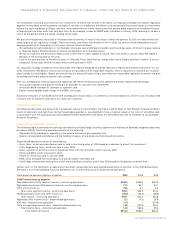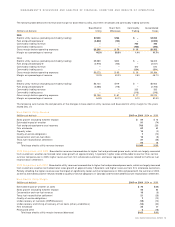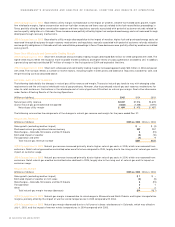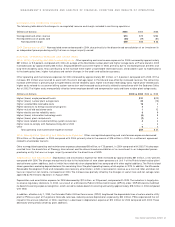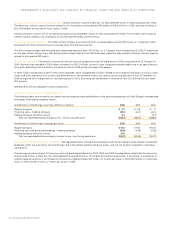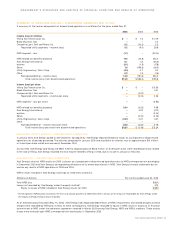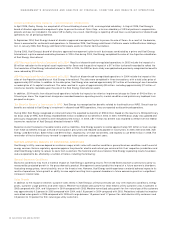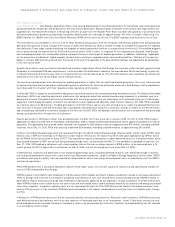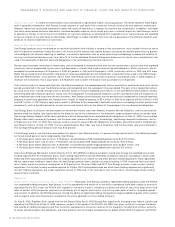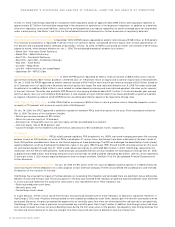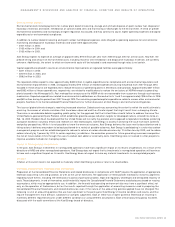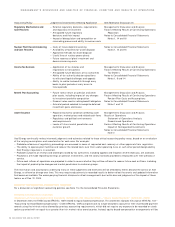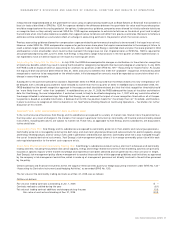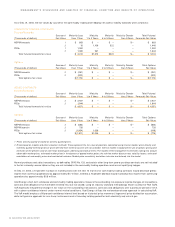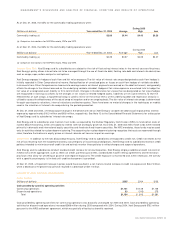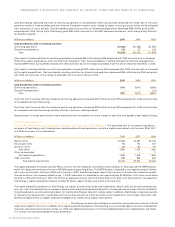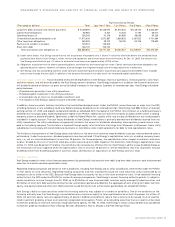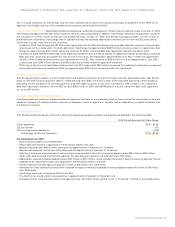Xcel Energy 2005 Annual Report Download - page 29
Download and view the complete annual report
Please find page 29 of the 2005 Xcel Energy annual report below. You can navigate through the pages in the report by either clicking on the pages listed below, or by using the keyword search tool below to find specific information within the annual report.state commissions were given similar authority to review the books and records of holding companies and their nonutility subsidiaries.
Despite these increases in the FERC’s authority, Xcel Energy believes that the repeal of the PUHCA will lessen its regulatory burdens and
give it more flexibility in the event it were to choose to expand its utility or nonutility businesses.
Besides repealing the PUHCA, the Energy Act is also expected to have substantial long-term effects on energy markets, energy investment
and regulation of public utilities and holding company systems by the FERC and the U.S. Department of Energy (DOE). The FERC and the DOE
are in various stages of rulemaking in implementing the Energy Policy Act. While the precise impact of these rulemakings cannot be determined
at this time, Xcel Energy generally views the Energy Act as legislation that will enhance the utility industry going forward.
Customer Rate Regulation
The FERC and various state regulatory commissions regulate Xcel Energy’s utility subsidiaries. Decisions by
these regulators can significantly impact Xcel Energy’s results of operations. Xcel Energy expects to periodically file for rate changes based
on changing energy market and general economic conditions.
The electric and natural gas rates charged to customers of Xcel Energy’s utility subsidiaries are approved by the FERC and the regulatory
commissions in the states in which they operate. The rates are generally designed to recover plant investment, operating costs and an
allowed return on investment. Xcel Energy requests changes in rates for utility services through filings with the governing commissions.
Because comprehensive general rate changes are requested infrequently in some states, changes in operating costs can affect Xcel Energy’s
financial results. In addition to changes in operating costs, other factors affecting rate filings are new investments, sales growth, conservation
and demand-side management efforts, and the cost of capital. In addition, the return on equity authorized is set by regulatory commissions in
rate proceedings. The most recently authorized electric utility returns are 11.47 percent for NSP-Minnesota; 11.0 percent for NSP-Wisconsin;
10.75 percent for PSCo; and 11.5 percent for SPS. The most recently authorized natural gas utility returns are 10.4 percent for NSP-Minnesota,
11.0 percent for NSP-Wisconsin and 10.5 percent for PSCo.
Wholesale Energy Market Regulation
In April 2005, a Day 2 wholesale energy market operated by the Midwest Independent Transmission
System Operator, Inc. (MISO) was implemented to centrally dispatch all regional electric generation and apply a regional transmission
congestion management system. MISO now centrally issues bills and payments for many costs formerly incurred directly by NSP-Minnesota
and NSP-Wisconsin. Both bills and payments from MISO for participation in this centrally dispatched market are received, resulting in a
net cost in serving Xcel Energy’s native load obligation. This net result is recorded as a component of operating and maintenance expenses.
The MPUC issued an interim order in April 2005 allowing MISO Day 2 charges to be recovered through the NSP-Minnesota Fuel Clause
Adjustment (FCA) mechanism. In December 2005, the MPUC issued a second interim order approving the recovery of certain MISO charges
through the FCA mechanism, but requiring that additional charges either be recovered as part of a general rate case or through an annual
review process outside the FCA mechanism, and requiring refunds of non-FCA costs. However, the December 2005 MPUC order also suspended
the refund obligation until such time as it could reconsider the matter. On Feb. 9, 2006, the MPUC voted to reconsider its December 2005 order.
The MPUC on reconsideration determined that parties be directed to determine which charges are appropriately in the FCA and which are
more appropriately established in base rates, and report back to the MPUC in 60 days; to grant deferred accounting treatment for costs ultimately
determined to be included in base rates for a period of 36 months, with recovery of deferred amounts to be reviewed in a general rate case;
and that amounts collected to date through the FCA under the April and December 2005 interim orders are not subject to refund. As a result,
NSP-Minnesota will be allowed to recover its prudently incurred MISO costs either through existing fuel clause mechanisms or in base rates.
In March 2005, the PSCW issued an interim order allowing NSP-Wisconsin deferred accounting treatment of MISO charges. However, the PSCW
staff issued an interpretive memorandum in October 2005 asserting that certain MISO costs may not be recovered through the interim fuel
cost mechanism and may not be deferrable. NSP-Wisconsin and the other Wisconsin utilities contested the PSCW’s interpretation in their
November comments to the PSCW. To date, NSP-Wisconsin has deferred approximately $5.7 million of MISO Day 2 costs as a regulatory asset.
Xcel Energy has notified MISO that NSP-Minnesota and NSP-Wisconsin may seek to withdraw from MISO if rate recovery of Day 2 costs is not
allowed. Withdrawal would require the FERC’s approval and could require Xcel Energy to pay a withdrawal fee.
In addition, pursuant to the FERC’s orders, NSP-Minnesota and NSP-Wisconsin are billed for certain MISO charges associated with the loads
of certain wholesale transmission service customers taking service under pre-MISO grandfathered agreements (GFA). In March 2005, Xcel
Energy filed for the FERC’s approval to pass through these charges to GFA customers. The FERC accepted the filing subject to refund and
hearing procedures. In 2005, NSP-Minnesota and NSP-Wisconsin were billed for $1.1 million of MISO charges, which have not yet been
recovered from GFA customers. The likelihood of full rate recovery is uncertain at this time. In addition, Xcel Energy has filed an appeal of
the FERC orders.
Capital Expenditure Regulation
Xcel Energy’s utility subsidiaries make substantial investments in plant additions to build and upgrade
power plants, and expand and maintain the reliability of the energy distribution system. In addition to filing for increases in base rates charged
to customers to recover the costs associated with such investments, in 2003 the CPUC and MPUC approved proposals to recover, through a
rate surcharge, certain costs to upgrade generation plants and lower emissions in the Denver and Minneapolis-St. Paul metropolitan areas.
These rate-recovery mechanisms are expected to provide significant cash flows to enable recovery of costs incurred on a timely basis.
Future Cost Recovery
Regulated public utilities are allowed to record as regulatory assets certain costs that are expected to be recovered
from customers in future periods, and to record as regulatory liabilities certain income items that are expected to be refunded to customers in
future periods. In contrast, nonregulated enterprises would expense these costs and recognize the income in the current period. If restructuring
or other changes in the regulatory environment occur, Xcel Energy may no longer be eligible to apply this accounting treatment, and may
be required to eliminate such regulatory assets and liabilities from its balance sheet. Such changes could have a material effect on Xcel Energy’s
results of operations in the period the write-off is recorded.
XCEL ENERGY 2005 ANNUAL REPORT 27
MANAGEMENT’S DISCUSSION AND ANALYSIS OF FINANCIAL CONDITION AND RESULTS OF OPERATIONS


